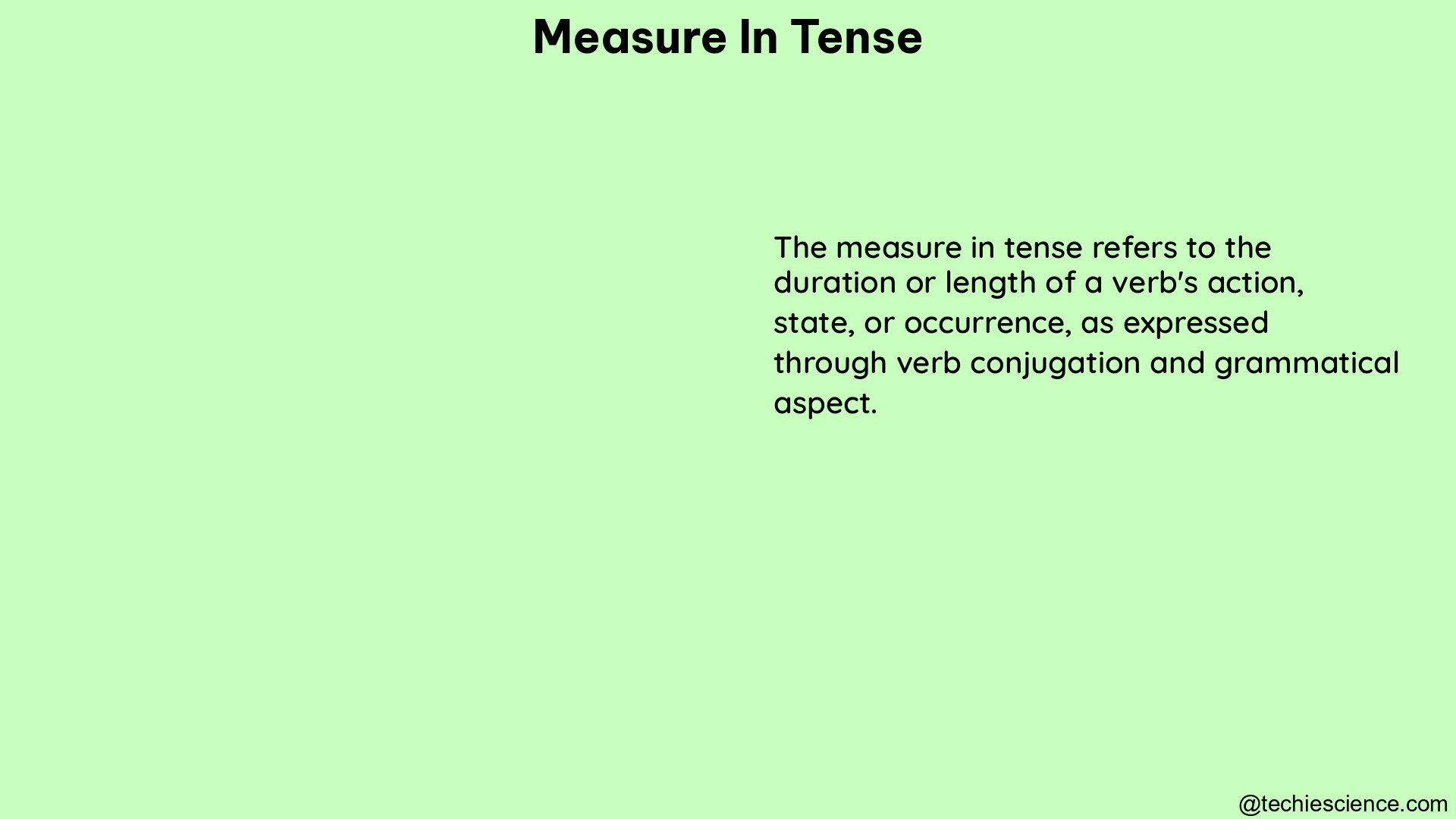The verb “to measure” is a fundamental part of the English language, used to describe the act of determining the dimensions, quantity, or capacity of something. Understanding the conjugation of this verb across various tenses is crucial for effective communication and writing. This comprehensive guide will delve into the intricate details of using the verb “measure” in different tenses, providing you with a thorough understanding of its usage.
The Present Tense
In the present tense, the verb “measure” follows a straightforward conjugation pattern:
Singular:
– I measure
– You measure
– He/She/It measures
Plural:
– We measure
– You measure
– They measure
Examples:
– “I measure the length of the table every day.”
– “She measures the ingredients carefully before baking.”
– “They measure the distance to the park every morning.”
The Present Progressive Tense

The present progressive tense is used to describe an ongoing action in the present. The conjugation of “measure” in this tense is as follows:
Singular:
– I am measuring
– You are measuring
– He/She/It is measuring
Plural:
– We are measuring
– You are measuring
– They are measuring
Examples:
– “I am measuring the width of the window right now.”
– “She is measuring the ingredients for the cake as we speak.”
– “They are measuring the distance to the park this morning.”
The Past Tense
In the past tense, the verb “measure” follows a regular conjugation pattern:
Singular:
– I measured
– You measured
– He/She/It measured
Plural:
– We measured
– You measured
– They measured
Examples:
– “I measured the length of the table yesterday.”
– “She measured the ingredients carefully before baking the cake.”
– “They measured the distance to the park last week.”
The Past Participle
The past participle of the verb “measure” is:
- Measured
This form is used in the present perfect, past perfect, and future perfect tenses.
The Present Perfect Tense
The present perfect tense is used to describe an action that has been completed in the past but has relevance in the present. The conjugation of “measure” in this tense is as follows:
Singular:
– I have measured
– You have measured
– He/She/It has measured
Plural:
– We have measured
– You have measured
– They have measured
Examples:
– “I have measured the length of the table three times.”
– “She has measured the ingredients for the cake with precision.”
– “They have measured the distance to the park several times this week.”
The Present Perfect Progressive Tense
The present perfect progressive tense is used to describe an ongoing action that began in the past and is still continuing in the present. The conjugation of “measure” in this tense is as follows:
Singular:
– I have been measuring
– You have been measuring
– He/She/It has been measuring
Plural:
– We have been measuring
– You have been measuring
– They have been measuring
Examples:
– “I have been measuring the width of the window for the past hour.”
– “She has been measuring the ingredients for the cake all morning.”
– “They have been measuring the distance to the park every day this week.”
The Past Progressive Tense
The past progressive tense is used to describe an ongoing action in the past. The conjugation of “measure” in this tense is as follows:
Singular:
– I was measuring
– You were measuring
– He/She/It was measuring
Plural:
– We were measuring
– You were measuring
– They were measuring
Examples:
– “I was measuring the length of the table when you walked in.”
– “She was measuring the ingredients for the cake when the power went out.”
– “They were measuring the distance to the park when it started raining.”
The Past Perfect Tense
The past perfect tense is used to describe an action that was completed before another past action or a specific point in time. The conjugation of “measure” in this tense is as follows:
Singular:
– I had measured
– You had measured
– He/She/It had measured
Plural:
– We had measured
– You had measured
– They had measured
Examples:
– “I had measured the length of the table before you arrived.”
– “She had measured the ingredients for the cake before the guests arrived.”
– “They had measured the distance to the park before the event started.”
The Past Perfect Progressive Tense
The past perfect progressive tense is used to describe an ongoing action that was in progress before another past action or a specific point in time. The conjugation of “measure” in this tense is as follows:
Singular:
– I had been measuring
– You had been measuring
– He/She/It had been measuring
Plural:
– We had been measuring
– You had been measuring
– They had been measuring
Examples:
– “I had been measuring the width of the window for an hour before you arrived.”
– “She had been measuring the ingredients for the cake for 30 minutes before the power went out.”
– “They had been measuring the distance to the park for several days before the event.”
The Future Tense
The future tense is used to describe an action that will occur in the future. The conjugation of “measure” in this tense is as follows:
Singular:
– I will measure
– You will measure
– He/She/It will measure
Plural:
– We will measure
– You will measure
– They will measure
Examples:
– “I will measure the length of the table tomorrow.”
– “She will measure the ingredients for the cake before baking.”
– “They will measure the distance to the park next week.”
The Future Progressive Tense
The future progressive tense is used to describe an ongoing action that will be in progress in the future. The conjugation of “measure” in this tense is as follows:
Singular:
– I will be measuring
– You will be measuring
– He/She/It will be measuring
Plural:
– We will be measuring
– You will be measuring
– They will be measuring
Examples:
– “I will be measuring the width of the window all day tomorrow.”
– “She will be measuring the ingredients for the cake while you are at work.”
– “They will be measuring the distance to the park during the event.”
The Future Perfect Tense
The future perfect tense is used to describe an action that will be completed by a specific point in the future. The conjugation of “measure” in this tense is as follows:
Singular:
– I will have measured
– You will have measured
– He/She/It will have measured
Plural:
– We will have measured
– You will have measured
– They will have measured
Examples:
– “I will have measured the length of the table by the time you arrive.”
– “She will have measured the ingredients for the cake before the guests arrive.”
– “They will have measured the distance to the park by the end of the day.”
The Future Perfect Progressive Tense
The future perfect progressive tense is used to describe an ongoing action that will be in progress by a specific point in the future. The conjugation of “measure” in this tense is as follows:
Singular:
– I will have been measuring
– You will have been measuring
– He/She/It will have been measuring
Plural:
– We will have been measuring
– You will have been measuring
– They will have been measuring
Examples:
– “I will have been measuring the width of the window for an hour by the time you arrive.”
– “She will have been measuring the ingredients for the cake for 30 minutes by the time the guests arrive.”
– “They will have been measuring the distance to the park for several days by the end of the event.”
Conditional Tenses
The conditional tenses are used to express hypothetical or uncertain situations. The conjugation of “measure” in the conditional tenses is as follows:
Conditional Present:
– I would measure
– You would measure
– He/She/It would measure
– We would measure
– You would measure
– They would measure
Conditional Present Progressive:
– I would be measuring
– You would be measuring
– He/She/It would be measuring
– We would be measuring
– You would be measuring
– They would be measuring
Conditional Perfect:
– I would have measured
– You would have measured
– He/She/It would have measured
– We would have measured
– You would have measured
– They would have measured
Examples:
– “I would measure the length of the table if I had a ruler.”
– “She would be measuring the ingredients for the cake if the power was on.”
– “They would have measured the distance to the park if they had more time.”
By mastering the conjugation of the verb “measure” in various tenses, you can effectively communicate your ideas and express yourself with precision in both written and spoken English. This comprehensive guide provides you with the necessary knowledge to confidently use the verb “measure” in a wide range of contexts.
References:
- https://simple.wiktionary.org/wiki/measured
- https://www.theconjugator.com/english/verb/to%2Bmeasure.html
- https://www.writingenglish.com/cverbs/measure.htm
- https://www.wordreference.com/conj/enverbs.aspx?v=measure
- https://en.bab.la/conjugation/english/measure

Hi…. I am Goutam Datta. I have completed a double M. A. in English and B. Ed. I am a creative writer. Currently, I am a part of the LambdaGeeks.